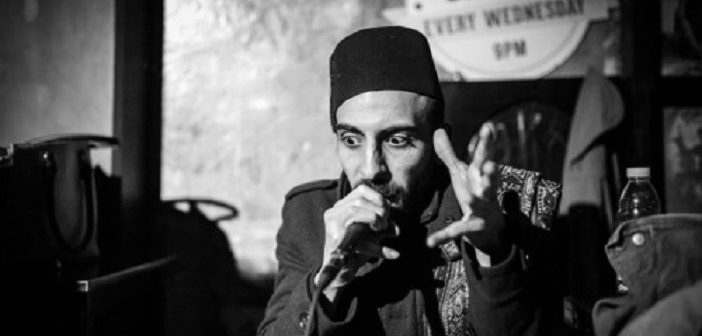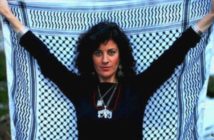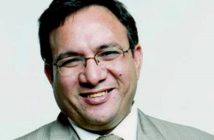“Bilad El-Sham (The Lands of Damascus) is a movement, not a band”, emphasizes Assasi (in Arabic, “Essential”), co-founder of the oriental hip-hop fusion movement. His fez and fast hip-hop style is one of his trademarks.
After five years the civil war in Syria is still going on but Bilad El-Sham gives hope through music for a better future and believes that he can achieve a change with it.
In one of his tracks featuring Ibrahim Basha Nurulez, Assasi’s first line translates to The Oud is strong, it didn’t break but the news did. Addressing the current situation of Syria and the refugees fleeing Syria because of the war, Assasi takes hip-hop as a vehicle to express all these issues.
Bilad El-Sham: A Hip-Hop Movement in the Making
Assasi wrote his first lines when he was fourteen. A neighbour in his home city of Aleppo discovered that Assasi could rhyme, he encouraged him to continue his musical journey and in 2003 he had his first gig at The French Cultural Center of Aleppo. Assasi remembered how he felt: “It was an amazing experience, I had original lyrics and the audience were repeating the chorus.” The hip-hop scene was still a small community, and Assasi only belongs to the second generation of hip-hop artists in the country. Although he did not get support from his parents, he decided to be a hip-hop artist and become independent.
The idea started to take form in 2008 when Khaled Arnaout decided to take hip-hop to the next level. Sharing this movement with like-minded artists from Syria and the region they started to perform together, and focused on hip-hop as a voice for unity, peace and open-mindedness. After Khaled Arnaout’s tragic death in 2010, Assasi took Bilad El-Sham as a platform to perform real hip-hop music in Arabic. Assasi describes what Bilad El-Sham means to him: “Everything I do with Bilad El-Sham is a tribute to Khaled. We can’t be united as a country so I show unity through the music.” The last time Assasi performed in Syria was in 2010, thousands of people attended the gig and he was overwhelmed by the turnout.
The idea of developing Bilad El-Sham as a movement and not as a band resulted in the changes that occurred with different artists coming and going. “I call it a movement because most of the musicians were from different countries, not only from Arab countries, but from America, Scotland and even India. Every one of these artists performed under the name Bilad El-Sham.” Even though many of those artists did not like hip-hop at first, they worked together with Assasi, because they believe that the idea of Bilad El-Sham is unique and good, and that is why they decided to play with him. Assasi adds: “This is ‘creating a new reality,’ as KRS-1 says. A hip-hop fusion project that unites people across different sounds and genres.”
Hip-Hop for Social Change
After the civil war erupted in 2011, Assasi went to Beirut. During his time there, he started jamming in the streets together with friends. After they got a positive reaction on the street, Assasi started to think about taking the movement to the next stage, so Bilad El-Sham was reborn as a movement. They performed together during 2012-2014and played eight shows together, along with appearances at festivals and events around Beirut. One of their first gigs was at Ta-Marbouta in Beirut. Almost a hundred people attended the concert and this was the next stage when Assasi thought they could do it. One of the biggest problems for this kind of musicians are that they usually tend not to get paid for what they are doing. Most of the time they are asked to play for free, even though it is their profession. Most of the people think that it is their hobby to play music but they depend on their music to earn a living and they cannot afford to play for free. Even though he lacks the resources to donate, he has continued to support causes such as the Fugee School in Malaysia with his encouragement and musical expertise.
Fusing Arabic with Hip-Hop
At the beginning Bilad El-Sham did not have instruments, and started sampling oriental music and original music of other people and sung it in different ways to fuse it with hip-hop. A song called 3ali Sawtak (Raise Your Voice) sung originally by Mohamed Mounir, a famous Egyptian singer, was taken and Assasi fused it with hip-hop, creating verses congenial to those of the original song.
The topics the movement addresses are about issues that concern the society in general. They are easy to understand, because Assasi wants every one to be able to understand the content of what he is rapping. They discuss dishonesty in the media, youth emigration, and other social concerns. Assasi emphasizes that they don’t cover politics. People living in Syria know about the situation, and the civil war, they don’t need another hip-hop artist to rap about politics. “I am not political. I don’t do politics. Some Syrian hip-hop artists focus on politics and this makes me feel they use politics to reach the audience.” That is why Assasi is trying to focus on social issues and not on political ones.
While he is not doing hip-hop, he loves listening to Reggae. He would like to learn bass, because he thinks it is the soul and the core of a song. When it comes to hip-hop, he is influenced by the classic old school of Western or American hip-hop music but he prefers working with live musicians rather than performing over prepared tracks.
A New Album in the Making
In 2013 the movement released the first album called The Clinic of Bilad El-Sham including six songs and a skit. It addresses different social issues of the region in order to raise the awareness of the people and give them hope. Before this release there were two unreleased albums, Bullet Speech and New Skills. Now, Assasi is in Malaysia, working on a new album called Third World Wide and is hoping to release the album later this year.





